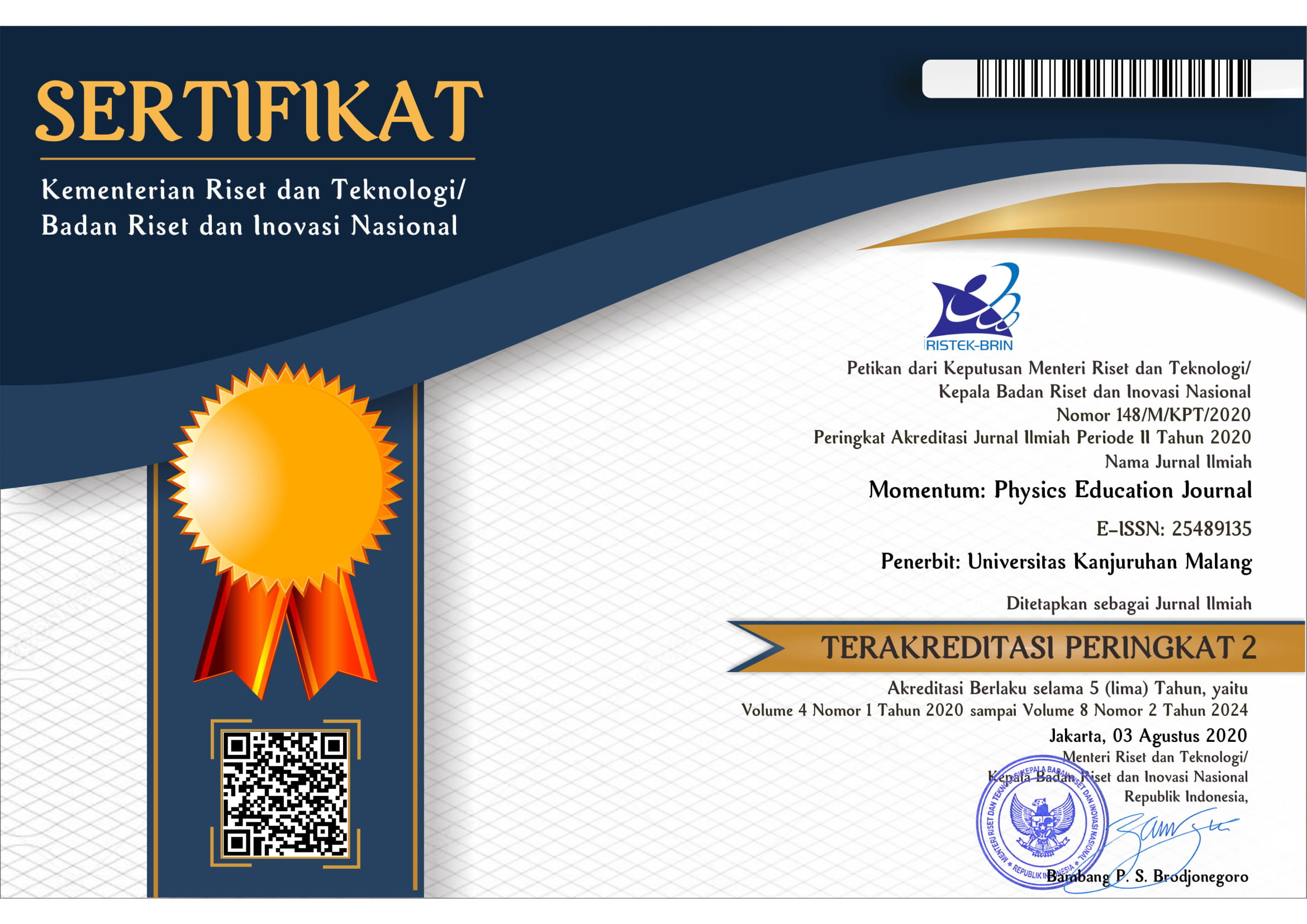The mastery of physics concepts between students are learning by ICT and laboratory experiments based-teaching
DOI:
https://doi.org/10.21067/mpej.v3i1.3343Keywords:
mastery concepts, ICT based-teaching, laboratory experiments based-teachingAbstract
The study aimed to examine differences in the mastery of physics concepts between students are learning by ICT based-teaching and laboratory experiments based-teaching. The particular research was quasi-experiment with a pretest-posttest design with nonequivalent groups. The sample size was three classes selected from the population of students on class X of SMA N 4 Kupang. The data collection method used multiple choice questions tests. Data analysis used independent samples t-test using SPSS 16.0 for Windows. The results of data analysis using t-test at a significance level of 0.05 indicated that there was a difference in the average mastery of physics concepts between students are learning by ICT based-teaching and the laboratory experiments based-teaching. The mean score of the mastery of physics concept on students are learning by ICT based-teaching was higher than students are learning by laboratory experiments based-teaching.
Downloads
References
Abdulwahed, M., & Nagy, Z. K. (2009). Applying kolb's experiential learning cycle for laboratory education. Journal of Engineering Education; Jul 2009; 98, 3.
Çakir, M. (2004). Exploring prospective secondary science teachers’ understandings o scientific inuiry and mendelian genetics concepts using computer simulation. ProQuest Information and Learning Company.
Depdiknas. (2003). Undang-Undang Republik Indonesia Nomor 20, Tahun 2003, tentang Sistem Pendidikan Nasional.
Depdiknas. (2005). Peraturan Pemerintah Republik Indonesia Nomor 19, Tahun 2005, tentang Standar Nasional Pendidikan.
Depdiknas. (2008). Peraturan Menteri Pendidikan Nasional Republik Indonesia Nomor 38, Tahun 2008, tentang Pengelolaan Teknologi Informasi dan Komunikasi di Lingkungan Departemen Pendidikan Nasional.
Eskrootchi, R., & Oskrochi, G. R. (2010). A Study of the efficacy of project-based learning integrated with computer-based Simulation-STELLA. Educational Technology & Society, 13 (1), 236–245.
Hamalik, Oemar. (2010). Psikologi belajar & mengajar. Bandung: Sinar Baru Aglesindo.
Hamid, A. (2004). Kajian Fisika Sekolah. Yogyakarta: FMIPA UNY.
Hamdani. (2011). Filsafat sains. Bandung: Pustaka Setia.
Istiningsih. (2012). Pemanfaatan TIK dalam pembelajaran. Yogyakarta: Skripta Media Kreativ.
Mohan, R. (2007). Innovative science teaching for physical science teachers, 3rd ed. New Delhi: prentice-Hall of India Privated Limited.
Mundilarto. (2002). Posisi dan peranan strategis pengajaran IPA (Fisika) di SLTP. Cakrawala Pendidikan, Jurnal Ilmiah Pendidikan November 2002, 339-356.
Mundilarto. (2013). Kefektifan pendekatan inquiry based learning untuk peningkatan karakter siswa SMA pada pembelajaran fisika. Cakrawala Pendidikan, Jurnal Ilmiah Pendidikan Juni 2013, 250-257.
Polacek, K. M. & keeling, E. L. (2005). Easy ways to promote inquiry in a laboratory course. Journal of College Science Teaching.
Revels, M. A. (2007). The learning impact of computer mediated communication on computer-based training. ProQuest Dissertations and Theses; 2007.
Sagala, S. (2012). Konsep dan makna pembelajaran, untuk membantu memecahkan problematika belajar dan mengajar. Bandung: alfabeta.
Smaldino, S. E., Lowther, D. L., dan Russel, J. D. (2012). Instructional technology and media for learning: Teknologi pembelajaran dan media untuk belajar. (Terjemahan Ari Rahman). Jakarta: Kencana. (Buku asli diterbitkan tahun 2011).
Sumardjoko, B. (2010). Faktor-faktor determinan peran dosen dalam penjaminan mutu perguruan tinggi. Cakrawala Pendidikan, 3, 29-310.
Sugiyono. (2013). Metode penelitian kuantitatif, kualitatif dan R&D. Bandung:: Alfabeta.
Suryadi, A. (2007). Pemanfaatan ICT dalam pembelajaran. Jurnal Pendidikan Terbuka dan Jarak Jauh, Volume 8, Nomor 1, Maret 2007, 83-98.
Sutopo, A. H. (2012). Teknologi informasi dan komunikasi dalam pendidikan. Yogyakarta: Graha Ilmu.
Downloads
Published
How to Cite
Issue
Section
License
Copyright (c) 2019 Momentum: Physics Education Journal

This work is licensed under a Creative Commons Attribution-ShareAlike 4.0 International License.


.png)
.png)
.png)
.png)




